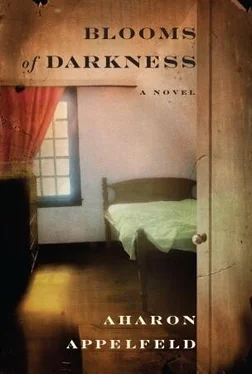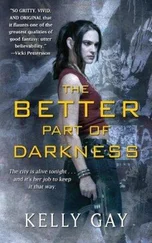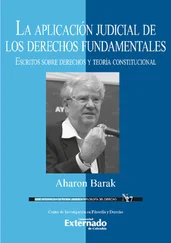“How long shall we stay here?” he hears one of the refugees ask another.
“I, at any rate, don’t intend to stay here long,” the man replies.
“And where will you go?”
“Anywhere, just not here.”
“I’ll wait,” says the first man cautiously. “They say that not everyone has returned.”
“Whoever hasn’t come back so far isn’t going to,” the other replies. His words cut like a knife.
Hugo partly grasps the meaning of their conversation. He is torn by his desire to wait for Mariana and his desire to leave this place. To separate himself from the refugees who surround him, Hugo gives himself over entirely to his imagination. He pictures Mariana and himself together in uninhabited green places similar to those where they had been before they were caught.
Suddenly a woman bursts into bitter tears. Everyone gathers around her, but it’s impossible to understand what she is saying. She mutters broken words and half-sentences that are incomprehensible. Finally she spits out, “I’m all alone. I have no one left in the world.”
“All of us are alone. Stop wailing.”
That reproach only increases her weeping.
Eventually they walk away from her. For a long time she cries bitterly, speaks about her parents and her sisters, and announces that there’s no reason to live without them. Her crying finally subsides, and gray perplexity freezes on her face. For a moment Hugo thinks of leaving the suitcase and the knapsack with the guard and returning home. His house isn’t far away — ten minutes at a run, and he’ll be there. He’ll go in, see if everything is in its place, and immediately return. The thought excites him, but then he remembers that all of Mariana’s worldly goods are packed in the suitcase. If it were lost or stolen, Mariana would never forgive him. While he is given over to his thoughts, a truck arrives and aims its rear at the gate. People immediately gather in the street. A priest, wearing a gilded hat and with a gleaming cross hanging from his chest, heads the group.
It is clear that something dreadful and momentous is about to happen. The people surrounding the truck watch the gate, but it doesn’t open. The priest begins a prayer, and those assembled join him. The prayer resounds and shakes the earth. More people gather and join in the prayer. Hugo gets the impression that they will stand there until the gate is opened and the imprisoned are freed.
As the praying continues, soldiers suddenly appear. They open the gate, storm the onlookers, and fire their guns in the air. There is a commotion, and Hugo grips the suitcase and the knapsack and pulls them to the side. The street empties out, and only the elderly priest remains on the sidewalk, praying determinedly.
Then the gate opens again, and women prisoners, wearing brown sackcloth dresses, emerge and are ordered to climb onto the truck. This isn’t easy for them to do, but they help one another. Some of them trip and fall, but in the end they all get on.
Hugo immediately recognizes Mariana and calls out loud, “Mariana.” People gather again and desperately call the names of the women who are standing in the truck, holding on to its bars. The priest waves his cross and raises his voice. “Jesus, save them,” he prays, “they have no help or savior beside you.” Hearing his supplication, everyone begins to pray again. The young soldiers are ill at ease for a moment, but then the order comes to shoot into the crowd. Now the prayers are mingled with sobs of pain. The women grabbing the bars of the truck look stunned by the sobbing and the shooting. Then they raise their arms and shout, “Jesus, we love you, you are the beloved of our heart forever and ever.” The driver starts the truck, and it leaves without delay.
“They were forced. They’re not guilty,” people shout. A few of the wounded lie on the ground, and others kneel and tear up their shirts to bandage them. Because of the wounded, the women prisoners are forgotten for a moment. Then Hugo hears someone say to his friend, “My poor sister, my good sister, she gave everything she had to her family. Now she’s on her way to death.”
“How do you know?”
“Don’t you know? The tribunal sentenced them to death by firing squad.”
The people gradually disperse. The wounded, after they are bandaged, sit leaning against a wall. Bewilderment settles in their eyes. Some of them curse, and one woman pounds her head with her fists. As always, after such a horror, there is anger and gnashing of teeth.
A small group of women sit on the ground and keen. “Why did they kill them? What harm did they do? Whom did they injure? They were young and beautiful, and they brought a bit of light into our dark world.” Later they change their tone and address heaven. “God, accept those young souls with love. You are merciful and forgiving, and You know that their souls were innocent and sought goodness. Fate was cruel to them. Now they are on their way to You. Don’t judge them severely, spare them.”
Hugo stays where he is. He feels that the words coming from the mourners’ mouths are powerful and aimed in the right direction. His whole body wants to weep, but his tears are frozen. One of the refugees is watching the women. “They know how to pray,” he says. “They address God the right way. Why are we mute? Why has prayer been taken from our mouths?”
“Are you still asking?” says his friend, who is standing next to him.
“Aren’t I allowed to ask?”
“A question for its own sake is stupid.”
Night falls. Everyone is tired. They sit by the fire and stare into it. No one asks what they are supposed to do or for whom they are supposed to wait to show them the way. Some of the men exchange banknotes and objects that appeared to be luxury items. There is great silence, as after a huge battle.
Hugo goes over to the guard at the gate and asks about the fate of the women who were taken away in the truck.
“What do you want to know?” The guard’s patience has worn out.
“Where are they?”
“You’re better off not knowing.”
“Is it impossible to go to them?”
“You’re apparently dumb,” he says, and turns his back.
Only now does Hugo realize that Mariana knew exactly what was coming. But in the green tranquility that surrounded them, her words had sounded to him like either hallucinations or irrational fears. Once she told him explicitly, “If they kill me, don’t forget me. You’re the only person in the world whom I trust. I buried some of my soul inside you. I don’t want to depart from the world without leaving you something of mine. I have no silver or gold. Take my love and hide it in your heart, and from time to time say to yourself, Once there was Mariana. She was a mortally wounded woman, but she never lost faith in God.”
That evening she went on to say other marvelous things, of which Hugo grasped only a little. Most of them were whispers that were swallowed up inside her. Now her words are returning to him with an intense clarity.
Hugo realizes that the guard at the gate is not only ignoring him, he is also contemptuous of him. Before long, he expresses his revulsion in two words: “Go away.”
Hugo returns to the square, to the refugees. The bonfire burns, and people surround it on all sides. The pot is full of soup, and everyone keeps refilling their bowls. Years of hunger take a while to satisfy. One old man claims that vegetable soup is a good thing for them to eat. The body has to get used to new conditions slowly, and it’s wrong to burden the digestive system with heavy foods. Vegetable soup is the correct food at this time. The others look at him with amazement, as if he were saying things to them that they had never heard.
Читать дальше












